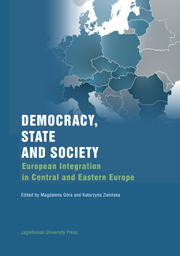Book contents
- Frontmatter
- Contents
- List of contributors
- Europeanisation in the EU New Member States. Aspects and Research Agendas
- Part one Democracy after Enlargement
- Part two Identity Transformations
- The Identity of Europeans after the EU Enlargement
- Peripheries and Borders in a Post-Western Europe
- Between Reconciliation and the Reactivation of Past Conflicts in Europe: Rethinking Social Memory Paradigms
- How Different is the “New Europe”? Perspectives on States and Minorities
- Part three Civil Society Organisations in Central and Eastern Europe
- Part four Europeanisation of International Relations
- Index
Between Reconciliation and the Reactivation of Past Conflicts in Europe: Rethinking Social Memory Paradigms
from Part two - Identity Transformations
Published online by Cambridge University Press: 05 September 2014
- Frontmatter
- Contents
- List of contributors
- Europeanisation in the EU New Member States. Aspects and Research Agendas
- Part one Democracy after Enlargement
- Part two Identity Transformations
- The Identity of Europeans after the EU Enlargement
- Peripheries and Borders in a Post-Western Europe
- Between Reconciliation and the Reactivation of Past Conflicts in Europe: Rethinking Social Memory Paradigms
- How Different is the “New Europe”? Perspectives on States and Minorities
- Part three Civil Society Organisations in Central and Eastern Europe
- Part four Europeanisation of International Relations
- Index
Summary
Abstract: Europe is grounded, from all sides, in traces of old inter-state and ethnic conflicts. Experience has proved that they can still be reactivated in spite of various forms of resolution in the past. History is welcome in the present, and we can observe mobilisation among agents, populations of victims, or despoiled groups, which have been forgotten or forced into silence through post-conflictual issues. Various interest groups, political parties, or states, build up memorial resources that they incorporate in their actions list of historicist strategies, with the aim of “recycling” the representations of the symbolic pasts into contemporary political games. These mobilisations meet the reconciliation trends coming from society (for example, informal groups, NGOs, and so on), or are taken in charge by national and international institutions – which are becoming more and more routine – especially under the influence of the circulation of “good” models of the pacification of resentments, containing a highly normative tone. The question is whether, in spite of the apparent heterogeneity of this phenomenon, the historicist games do constitute a common indicator of the state of political regimes, especially democracies, and also of the strength of that supranational construction called the EU. This question necessitates the revisiting of the dominant concepts in the field of the political sociology of memory.
- Type
- Chapter
- Information
- Democracy, State and SocietyEuropean Integration in Central and Eastern Europe, pp. 127 - 146Publisher: Jagiellonian University PressPrint publication year: 2011



